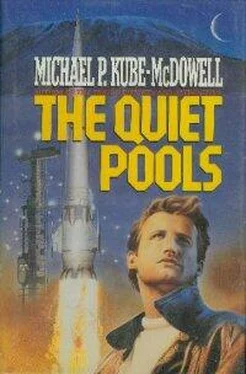His expertise was unquestioned, but Dryke had always wondered at his interest. The committee was unpaid and unsung, second only to Sasaki in influence but invisible behind her. It seemed an odd place to find a Roger Marshall, unless he simply considered the Project as an interesting hobby, interesting enough that he was content with a secondary role. Dryke had no idea what a man who commanded wealth on Marshall’s scale did for self-indulgence.
That day, Marshall appeared at Dryke’s office without warning. “Good afternoon, Mr. Dryke,” he said, showing a friendly but measured smile. “Is there any chance I might steal you away from here for a while?”
It was like asking Sisyphus if he had any interest in a five-minute break. “A pretty good chance, I’d say. What’s the problem, Mr. Marshall?”
“Roger, please. I understand we’re processing a lot of the pioneers through Prainha,” Marshall said, folding his arms over his chest. “I’d like to talk to some of them. I want to get a handle on how they’re coping with all the disruption from C-Zero.”
The first part was both true and common knowledge. Twenty-seat T-2s packed with colonists were flying out of the castle a dozen times a day, day after day. But for the twin bottlenecks of security screening and ferrying them from the low-orbit stations to Takara, the pace would be even brisker.
The second part was both insulting and puzzling. Have I been demoted to tour guide now ? Marshall did not need Dryke’s permission to visit Building 5, where the arriving pioneers were being assembled into groups, taken through a T-2 mock-up and orientation, and given a place to wait comfortably until their flight was called. And Training Section could provide far more knowledgeable escorts than he.
But Dryke acceded to Marshall’s request, all the same. They took a wirecar over to Building 5, where Dryke ran interference with the harried Move managers. Then he stood in the background while Marshall talked with a group of Block 2 pioneers waiting for their midafternoon launch. One confessed to annoyance, one to apprehension. But the rest were almost defiantly eager—for them, the adventure had already begun.
“We’re not going to let them stop us,” one woman told Marshall. “This is something that belongs to us, and nobody has the right to take it away.”
Marshall did not seem to have to hear much to satisfy him. After fifteen minutes, he shook hands, wished luck, and took his leave.
“Walk with me, will you, Mikhail?” he said to Dryke when they were outside.
Mystified, Dryke sent the wirecar back and fell in beside Marshall. The unscreened sun was fierce. After a few dozen steps, Dryke was perspiring.
“It’s going surprisingly well,” Marshall said. “Surprising to me, in any case. Nine thousand colonists, a thousand or so from Training—that’s a lot of bodies to move in less than a month. A lot of coordination. And so far, none of our watchdogs have barked. That’s a credit to you.”
“It’s all being handled by staff,” Dryke said, already starting to feel the midday heat. “I haven’t had anything to do with it.”
“Take the compliment and forget the blushing. You’d be blamed if they screwed up,” said Marshall. “Besides, I haven’t gotten to the tough parts. Tell me about the centers. What’s happening in Tokyo?”
“Tokyo is closed down, for all practical purposes,” Dryke said. “The work that could still be done there under siege conditions isn’t worth the risk to our people. We have a hundred or so security officers and a couple of dozen operations techs inside, which is about the limit we can support from the air, with the roof pad.”
“It’s important to protect the building,” said Marshall. “We do want to go back there—or at least be able to sell the building—when Memphis is gone and things have quieted down. What about the other sites?”
“Still more or less normal, except for the absence of the pioneers. Munich can thank the German government. Houston has its own airfield and its own housing, of course—they can probably ride out most anything so long as the fences hold.”
Marshall nodded. “It’s good to know that we’re still ready to fight on some fronts. This new strategy—I guess I’m a bit more of a scrapper than Hiroko. I hate to see us cede anything. Did you sign off on Contingency Zero?”
“It wasn’t my call.”
“And if it had been?”
Dryke was wary. “If it had been my call, I wouldn’t have put the training centers in urban sites in the first place. We’re a lot more secure here than they are in Houston.”
Nodding thoughtfully, Marshall said, “Maybe we should be keeping those people we just talked to here, then. Maybe shipping everyone up to Takara and Memphis is an overreaction.”
“That’s where they’re going eventually,” Dryke said, wiping the sweat from his forehead with his sleeve. “And as you said, that part is going smoothly, at least. No harm, no foul.”
The scream of a T-ship passing overhead distracted them briefly.
“Some of us have noticed that you’ve been taking a back seat since you reeled in Jeremiah for us,” Marshall said.
“Resting on my laurels,” Dryke said. A touch of the bitterness slipped out with the words.
Marshall smiled. “I knew Bill McCutcheon. Were you aware of that?”
Eyes widening, Dryke admitted, “No.”
“Well, you would be soon, I imagine. I assume that you’re building a matrix of his contacts, looking for the rest of the Homeworld leadership.”
“Yes.” The truth was that he had not been able to work up any sense of urgency about what was certain to be a massive undertaking, and so had not even begun.
“He beat me to a parcel of land in Mexico a few years back,” Marshall said. “I offered him more than it was worth, too, but he wouldn’t sell it to me. He never did anything with it, either. A lot of his holdings were undeveloped, as a matter of fact.”
“Oh?”
“If ten percent of what he owned produced income, I’d be surprised. He was land-rich and cash-poor. Not your traditional land speculator, though. More a land investor. Up until the last few months, he bought more than he sold—which is the hard way, since you don’t realize any gains until you sell.”
“What was that about the last few months?”
“Bill moved ten or twelve parcels since August. Knowing what we know now, I suppose he needed operating funds—but I’m not telling you anything you didn’t know. I imagine you’re following the money, too.”
Dryke squinted sideways at his companion. “Why did you want to see me, Mr. Marshall?”
“I always valued your perspective, Mikhail,” Marshall said. “Just because the Director is looking past you at the moment, I didn’t see any reason I couldn’t avail myself of it on my own.”
Dryke could find no argument with that. “What do you want my perspective on?”
“Has Homeworld been eliminated as a threat?”
“I wouldn’t assume so.”
“Nor would I. How would you characterize our strategy at this point?”
Lips pursed, Dryke considered. “A controlled retreat under cover of darkness. Abandoning a vulnerable position for a more secure one.” It was clear now that their conversation was a footnote to an argument that had taken place behind closed doors.
“But we’re most vulnerable now—halfway between.”
“Yes.”
“If they find out what’s happening before we’re finished, it’ll be like showing a gimpy leg to a wolf pack.” There was no need to define they —it embraced Homeworld, the media, and any other opponent or obstacle.
“It wouldn’t look good, no.”
“And it could happen.”
Читать дальше

![Nick Cracknell - The Quiet Apocalypse [= Island Zero]](/books/28041/nick-cracknell-the-quiet-apocalypse-island-zero-thumb.webp)










